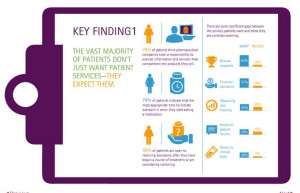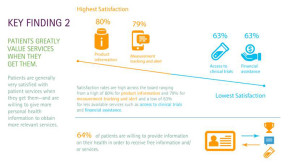 In our increasingly-DIY society, most consumers expect high levels of access and customer service from the organizations with whom we engage. With more consumers reaching into their pockets to pay for health services and products, the health industry is increasingly a retail-facing environment. So expect quality service levels from their healthcare touch points.
In our increasingly-DIY society, most consumers expect high levels of access and customer service from the organizations with whom we engage. With more consumers reaching into their pockets to pay for health services and products, the health industry is increasingly a retail-facing environment. So expect quality service levels from their healthcare touch points.
The pharmaceutical and prescription drug touch point is not exempt from this expectation, as learned by an Accenture survey analyzed in Great Expectations: Why Pharma Companies Can’t Ignore Patient Services.
As the first picture shows, 70% of patients think pharma companies are responsible for bundling information and services around the products they market. 74% of patients are looking for those services as soon as they begin to take a medication, and half would be open to receiving assistance once they began taking the meds.
 Specific services patients look to pharma companies for include: reward programs, sought by two-thirds of patients (think loyalty for Rx-taking); financial assistance (access programs) valued by 51% of patients; and tracking, access to patient forums and clinical trials, sought by one-third of fewer patients.
Specific services patients look to pharma companies for include: reward programs, sought by two-thirds of patients (think loyalty for Rx-taking); financial assistance (access programs) valued by 51% of patients; and tracking, access to patient forums and clinical trials, sought by one-third of fewer patients.
The second chart illustrates that patients value these kinds of services. Specifically, 8 in 10 consumers who received product information and measurement tracking and alerts were highly satisfied with these programs. In contrast, people felt low satisfaction from financial assistance (Rx access) programs.
With respect to information, patients are most interested in info on medications, chronic conditions, healthcare services, and illnesses/ailments. That information should be provided via digital channels like email (preferred by 69%), print (66%), websites (48%), mobile apps (44%), and social media (38%).
Two in 3 patients told Accenture they’d be willing to provide personal health information in order to receive free information and services.
Methodology: Accenture commissioned an online survey among 2,000 U.S. adults in September-October 2013.
Health Populi’s Hot Points: This survey demonstrates that health consumers understand trade-offs between sharing personal health information and receiving valuable services in return. This is a kind of healthcareDIY barter: when the consumer values what’s available in return, she’ll share her personal health information. If the trade-off isn’t seen as valuable, then information won’t be shared.
This value trade-off equation works across three patient populations Accenture polled:
- 69% of people currently taking lifestyle meds would be willing to provide information on their health in order to receive free information or services in return
- 63% of people currently taking long-term meds would share information in return
- 60% of people currently taking short-term medications would share information in return.
After free information, which is the most highly-valued service a pharma can provide, financial assistance and rewards programs take second and third place in patient ranking — across all 3 patient types (currently taking lifestyle, short-term, or long-term meds).
Another important finding that’s new is that fully one-third of people said they would like help with measurement and tracking and alerts, and adherence support. This being the Holy Grail of pharma — seeing that patients fill prescriptions and continue to take prescribed medications over the course of the physician-recommended treatment — should be good news for CFOs of pharma companies.
Launching highly-valued consumer-centered services will require all-hands-on-deck across various silos in pharma companies: this isn’t just the brand marketer’s job. Since finance for prescription drugs is top-of-mind for health consumers, as identified here in the survey and in others, pharma teams must go well beyond providing information to delight today’s service-oriented prescription drug customer.
For more on HealthcareDIY and prescription drugs, see How to shop for medicines.





 Grateful to Gregg Malkary for inviting me to join his podcast
Grateful to Gregg Malkary for inviting me to join his podcast  This conversation with Lynn Hanessian, chief strategist at Edelman, rings truer in today's context than on the day we recorded it. We're
This conversation with Lynn Hanessian, chief strategist at Edelman, rings truer in today's context than on the day we recorded it. We're